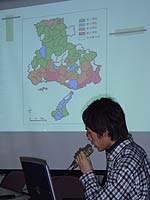 Human geography is the study of the relationships between people and their environment and region. This field contains a variety of perspectives with important keywords, including environment, region, space, landscape, place, network, and flow. Students taking this course analyze and consider the relationship between people and their environment as well as people and space using a variety of models and frameworks. Students will develop their knowledge base and gain skills throughout the course, learning in lectures about the perspectives and methodologies of previous research. They will also gain experience in textual analysis, fieldwork, data analysis, diagraming, presentations in seminars, and practical training.
Human geography is the study of the relationships between people and their environment and region. This field contains a variety of perspectives with important keywords, including environment, region, space, landscape, place, network, and flow. Students taking this course analyze and consider the relationship between people and their environment as well as people and space using a variety of models and frameworks. Students will develop their knowledge base and gain skills throughout the course, learning in lectures about the perspectives and methodologies of previous research. They will also gain experience in textual analysis, fieldwork, data analysis, diagraming, presentations in seminars, and practical training.
The Human Geography Department was established in 1995. Before the department’s founding, its faculty members built up research and educational expertise with notable findings emerging from the study of old maps and historical geography. In recent years, researchers at the university have been heavily engaged in urban and agricultural exploration as well as multifaceted research and education. Human geography is thus a gateway to a wide range of specialties.
Professors
- TSUTSUMI, Kenji (Ph.D.)
- Social and Economic Geography; Research on Depopulated Regions, Regional Transformation and Modernization
- SATO, Ren’ya (Ph.D.)
- Cultural ecology, resource use, indigenous knowledge and technology, and socio-cultural change of Sub-Saharan Africa and East/Southeast Asia.
Website: http://www.let.osaka-u.ac.jp/geography/sato/satoengmain.html
Associate Professor
- IMOTO, Yasuko (MA)
- Cultural Anthropology; Ethnographic Studies of Italy and Mediterranean Europe Rethinking of Structural Anthropology; Structural approach to popular culture, Revisiting Space and Place from the Perspective of Dual Societies.
- ORO, Kohei (MA)
- Environmental science/Agricultural science, Agricultural sociology; Humanities & social sciences, Agricultural and food economics; Humanities & social sciences, Human geography.
